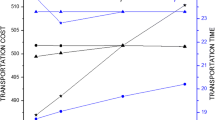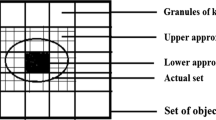Abstract
This paper investigates some multi-objective fixed charge solid transportation problems (FCSTPs) under fuzzy-random environment with fuzzy-random fixed charges and transportation times. Here objectives are total transportation cost and time which are minimized. Unit transportation costs are crisp and three types of discount i.e. All Unit Discount (AUD), Incremental Quantity Discount (IQD), IQD within AUD are applied upon these costs. In the first model (Model-I) supplies, demands and capacities of conveyances are assumed to be fuzzy-random in nature. These quantities are fuzzy in the second model (Model-II). Imprecise objectives of the models are transformed into equivalent crisp ones using random expectation and fuzzy possibility/necessity measures on fuzzy event. Imprecise constraints are reduced to equivalent crisp constraints using two different fuzzy-random chance constraint methods. Similarly constraints of Model-II are reduced to equivalent crisp constraints with the use of possibility and necessity measures on fuzzy events. Models are also formulated with and without entropy function. Finally transformed constrained multi-objective deterministic problems are solved using a multi-objective genetic algorithm (MOGA) based on arithmetic crossover and boundary mutation. Moreover, Model-IA1 is converted to a single objective non-linear programming (SONLP) problem following fuzzy non-linear programming (FNLP) technique and the reduced Model-IA1S is solved using generalized reduced gradient (GRG) method (using LINGO software). Numerical examples are used for illustration and comparison of the models.


Similar content being viewed by others
References
Buckley, J.J.: Fuzzy Probabilities:New Approach and Applications. Physica-Verlag, Heidelberg (2003)
Buckley, J.J., Eslami, E.: Uncertain probabilities-1. Soft. Comput. 7, 500–505 (2003)
Bit, A.K., Biswal, M.P., Alam, S.S.: Fuzzy programming approach to multi-objective solid transportation problem. Fuzzy Sets Syst. 157, 183–194 (1993)
Chalam, G.A.: Fuzzy goal programming (FGP) approach to a stochastic transportation problem under budgetary constraint. Fuzzy Sets Syst. 66, 293–299 (1994)
Cooper, L.: The stochastic transportation-location problem. Comput. Math. Appl. 4, 265–275 (1978)
Deb, K., Pratap, A., Agarawal, S., Meyarivan, T.: A fast and elitist multiobjective genetic algorithm. NSGA-11 IEEE Transp. Evol. Comput., 182–197 (2002)
Dubois, D., Prade, H.: Ranking fuzzy numbers in the setting of possibility theory. Inf. Sci. 30, 183–224 (1983)
Feng, Y.: Gaussian fuzzy random variables. Fuzzy Sets Syst. 111, 325–330 (2000)
Gen, M., Ida, K., Li, Y., Kubota, E.: Solving bicriteria solid transportation problem with fuzzy numbers by a genetic algorithm. Comput. Ind. Eng. 29, 537–541 (1995)
Gottlieb, J., Paulmann, L.: Genetic algorithms for the fixed charge transportation problems. In: Proceedings of the IEEE Conference on Evolutionary Computation, pp. 330335. ICEC (1998)
Haley, K.B.: The solid transportation problem. Oper. Res. 11, 446–448 (1962)
Hirsch, W.M., Dantzig, G.B.: The fixed charge problem. Naval Research. Logist. Q. 15, 413–424 (1968)
Holland, H.J.: Adaptation in Natural and Artificial Systems. University of Michigan (1975)
Jia, J., Chen, J., Chang, G., Tan, Z.: Energy efficient converge control in wireless sensor networks based on multi-objective genetic algorithem. Comput. Math. Appl. 57(11–12), 1756–1766 (2009)
Jimenez, F., Verdegay, J.L.: Interval multi objective solid transportation problem via genetic algorithms. Manag. Uncertain. Knowl.-Based Syst. 11, 787–792 (1996)
Jimenez, F., Verdegay, J.L.: Uncertain solid transportation problem. Fuzzy Sets Syst. 100, 45–57 (1998)
Kapur, J.N., Kesavan, H.K.: Entropy Optimization Principles with Application.Academic, San Diego (1992)
Katagiri, H., Sakawa, M., Kato, K., Nishizaki, I.: A fuzzy random multi-objective 01 programming based on the expectation optimization model using possibility and necessity measures. Math. Comput. Model. 40, 411–421 (2004)
Kaur, A., Kumar, A.: A new approach for solving fuzzy transportation problems using generalized trapezoidal fuzzy numbers. Appl. Soft Comput. 12, 1201–1213 (2012)
Kennington, J.L., Unger, V.E.: A new branch and bound algorithm for the fixed charge transportation problem. Manag. Sci. 22, 1116–1126 (1976)
Keshavarz, E., Khorram, E.: A fuzzy bi-criteria transportation problem. Comput. Ind. Eng. 61, 947–957 (2011)
Kruse, R., Meyer, K.D.: Statistics with Vague Data. D. Riedel Publishing Company, Dordrecht (1987)
Kwakernaak, H.: Fuzzy random variables I. Definitions and theorems. Inf. Sci. 15(1), 129 (1978)
Li, Y., Ida, K., Gen, M.: Improved genetic algorithm for solving multi objective solid transportation problem with fuzzy numbers. Comput. Ind. Eng. 33, 589–592 (1997)
Li, J., Xu, J., Gen, M.: A class of multiobjective linear programming model with fuzzy random coefficients. Math. Comput. Model. 44, 1097–1113 (2006)
Liu, B.: Stackelberg-Nash equilibrium for multilevel programming with multiple flowers using genetic algorithms. Comput. Math. Appl. 36(7), 79–89 (1998)
Liu, B.: Uncertainty theory: An Introduction to its axiomatic Foundation, Springer-Verleg, Berlin (2004).
Liu, B., Iwamura, K.: A note on chance constrained programming with fuzzy coefficients. Fuzzy Sets Syst. 100, 229–233 (1998)
Liu, S.L., Kao, C.: Solving fuzzy transportation problems based on extension principle. Eur. J. Oper. Res. 153, 661–674 (2004)
Liu, S.: Fuzzy total transportation cost measures for fuzzy solid transportation problem. Appl. Math. Comput. 174, 927–941 (2006)
Malekly, H., Haddadi, B., Tavakkoli-Moghadam, R.: A fuzzy random vehicle routing problem: the case of Iran. In: Proceeding of the 39th International Conference on Computers and Industrial Engineering, pp. 1070–1075 (2009)
Michalewicz, Z., Janikow, C.: Genetic algorithms for numerical optimization. Stat. Comput. 1, 75–91 (1991)
Michalewicz, Z.: Genetic Algorithms + Data Structures = Evolution Programs. Springer-Verlag, Third revised and extended (1992)
Nanda, S., Kar, K.: Convex fuzzy mapping. Fuzzy Sets Syst. 48, 129–132 (1992)
Nanda, S., Panda, G., Dash, J.K.: A new methodology for crisp equivalent of fuzzy chance constrained programming problem. Fuzzy Optim. Decis. Making 7, 59–74 (2008)
Ojha, A., Das, B., Mondal, S., Maiti, M.: A stochastic discounted multi-objective solid transportation problem for breakable items using analytical hierarchy process. Appl. Math. Model. 34, 2256–2271 (2010a)
Ojha, A., Das, B., Mondal, S., Maiti, M.: A solid transportation problem for an item with fixed charge vechicle cost and price discounted varying charge using genetic algorithm. Appl. Soft Comput. 10, 100–110 (2010b)
Puri, M.L., Ralescu, D.A.: Fuzzy random variables. Aust. J. Math. Anal. Appl. 114(2), 409–422 (1986)
Robers, P., Cooper, L.: A study of the fixed charge transportation problem. Comput. Math. Appl. 2(2), 125–135 (1976)
Saad, O.M., Abbas, S.A.: A parametric study on transportation problem under fuzzy environment. J. Fuzzy Math. 11, 115–124 (2003)
Sadi-Nezhad, S., Damaghani, K.K.: A modified TOPSIS technique in presence of uncertainty and its application to assesment of transportation system. Int. J. Manag. Sci. Eng. Manag. 6(1), 3–13 (2011)
Sakawa, M.: Fuzzy Sets and Interactive Multiobective Optimization. Plenum, New York (1993)
Samanta, B., Roy, T.K.: Multi-objective entropy transportation model with trapezoidal fuzzy number penalities, sources and destination. J. Transp. Eng. 136(6), 419–428 (2005)
Sun, M., Aronson, J.E., Mckeown, P.G., Dennis, D.: A tabu search heuristic procedure for fixed charge transportation problem. Eur. J. Oper. Res. 106, 411–456 (1998)
Tao, Z., Xu, J.: A class of rough multiple objective programming and its application to solid transportation problem. Inf. Sci. 188, 215–235 (2012)
Xie, J., Dong, J.: Heuristic genetic algorithms for general capaciated lot sizing problems. Comput. Math. Appl. 44(1–2), 263–276 (2002)
Xu, J., Yan, F., Li, S.: Vehicle routing optimization with soft time windows in a fuzzy random environment. Transp. Res. E. 47(6), 1075–1091 (2011)
Yang, J., Zhang, M., He, B., Yang, C.: Bi-level programming model and hybrid genetic algorithm for flow interception problem with customer choice. Comput. Math. Appl. 57(11–12), 1985–1994 (2009)
Yang, L., Feng, Y.: A bicriteria solid transportation problem with fixed charge under stochastic environment. Appl. Math. Model. 31, 2668–2683 (2007)
Yang, L., Liu, L.: Fuzzy fixed charge solid transportation problem and algorithm. Appl. Soft Comput. 7, 879–889 (2007)
Wang, G., Wan, Z., Wang, X., Lv, Y.: Genetic algorithm based on simplex method for solving linear quadratic bilevel programming problem. Comput. Math. Appl. 56(10), 2550–2555 (2008)
Wang, X.: Continuous review inventory model with variable lead time in a fuzzy random environment. Expert Syst. Appl. 38, 11715–11721 (2011)
Wen, M., Kang, R.: Some optimal models for facility locationallocation problem with random fuzzy demands. Appl. Soft Comput. 11, 1202–1207 (2011)
Wu, H.C.: Statistical confidence intervals for fuzzy data. Expert Syst. Appl. 36, 2670–2676 (2009)
Zadeh, L.A.: The Concept of Linguistic Variable and Application to Approximate Reasoning. Memorandum ERL-M, 411 Berkeley (1973)
Zadeh, L.A.: Fuzzy set as a basis for a theory of possibility. Fuzzy Sets Syst. 1, 3–28 (1978)
Author information
Authors and Affiliations
Corresponding author
Rights and permissions
About this article
Cite this article
Giri, P.K., Maiti, M.K. & Maiti, M. Entropy based solid transportation problems with discounted unit costs under fuzzy random environment. OPSEARCH 51, 479–532 (2014). https://doi.org/10.1007/s12597-013-0155-0
Accepted:
Published:
Issue Date:
DOI: https://doi.org/10.1007/s12597-013-0155-0




